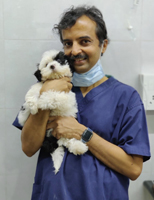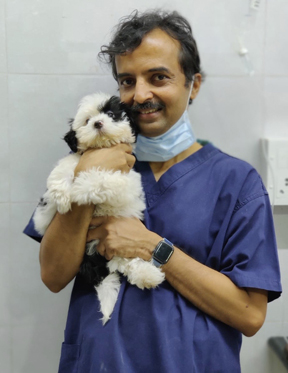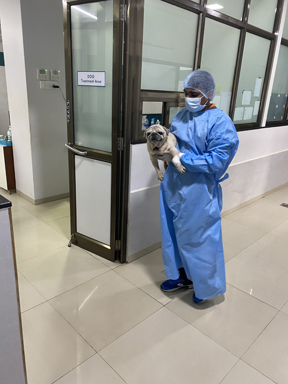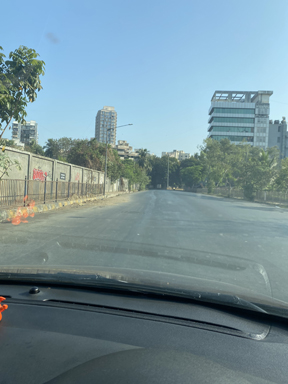
Dr. Makarand Chousalkar 288

Photo courtesy of Dr. Makarand Chousalkar
Dr. Makarand Chousalkar, shown with a patient at his practice in Mumbai, India, is the son and husband of veterinarians, and the father of a soon-to-be veterinarian.
Dr. Makarand Chousalkar, 49, is chief veterinarian of a multi-doctor dog-and-cat practice in Mumbai, India, which he co-owns with his wife. He is a native of Mumbai, one of the top five most populous cities in the world, with more than 26 million inhabitants. The son of a veterinarian, Chousalkar lives in Andheri, a busy suburb west of Mumbai, with his spouse, a veterinarian who manages their clinic; and their daughter, who is in her final year of veterinary school.
By email, Chousalkar answered questions about everyday life in Mumbai during the COVID-19 pandemic. India has logged more than 12,300 cases and 400 deaths, according to a count kept by a Johns Hopkins University team.
When did you first learn about the disease that would become known as COVID-19? What was your initial reaction?
We were reading stories from China in mid-January, when a few cases of the "Wuhan Fever" were making news. We were not really worried, as the initial cases were restricted to China. As news of the spread to other countries and continents started making waves in the media, we started to worry. Initially, it was thought to be just like any other flu virus but as we got to know more about the disease and its ability to spread so quickly, my family and clinic colleagues started getting concerned.
India currently has a relatively low number of reported cases of infection and related deaths. I've seen estimates that the country is about two weeks behind the United States and four weeks behind Italy in terms of when the first cases were seen. What is the outlook at this time?
India reported its first case on Jan. 30. The initial spread was really slow, but now we feel that it is spreading very fast every passing day ... [A]nd the lack of available testing kits might be underestimating it. The current rate of doubling [as of April 9] the number of cases is 3.5 days, much lower than seen in Europe and United States.
What are the restrictions right now in Mumbai? How has daily life changed? What businesses are open? What is street life like?
Mumbai has been under complete lockdown for almost 19 days now. As I write this, the lockdown period has been extended from three weeks to five weeks. [A new extension announced this week takes the lockdown to May 3.] Only essential services like hospitals, grocery stores and banks are open. Everyone else is working from home. Government offices are working with reduced staff. This is going to have a huge economic impact on the entire country.
The busy Mumbai streets are empty, and we can breathe fresh air in the mornings, as the pollution levels have dropped. We are also hearing about a resurgence of wildlife on some streets of Mumbai! People are seen spending more time with families, which is a rare thing. In normal times, the average person spends at least three hours a day commuting, leaving very little time for the family. "What's cooking" is the buzz on WhatsApp these days.
How are people responding to government measures to contain the virus?
Generally, people are cooperative but there have been a few cases where they violated the government directives with mass gatherings, which caused a huge spike in the spread of the disease. Since India has had the advantage of watching the rest of the world get the pandemic, the country started relatively early to take lockdown measures. India has been importing testing kits; however, recently, an Indian company began manufacturing kits, and is making them available for large-scale testing.
The challenge for the government will be taking care of very sick patients who will need hospitalization and possibly be put on mechanical ventilators. Medical facilities will be stretched, for sure, but the government is trying its best. The initial lockdown triggered fear, and people were in a panic-buying mood. Essential goods and groceries are available, so panic buying has definitely settled down now.
The greater Mumbai area is home to more than 26 million people. What are your biggest concerns in the coming days, weeks and months?
Mumbai runner 288

Photo courtesy of Dr. Makarand Chousalkar
To reduce the risk of exposing staff and clients to the coronavirus that causes COVID-19, Chousalkar has stopped seeing pets and their owners in an open treatment area. Now, a designated "runner" wearing protective gear fetches pets from and returns them to their owners, who wait in the parking lot.
Mumbai, as you know, is a very densely populated city with an extremely complex city layout. A large portion of the population resides in small houses and shanties. We fear that entry of COVID-19 to the shanties would cause havoc, making it difficult to stop the spread. Reaching out to infected people is not an easy task, as local authorities have to navigate through small lanes and bylanes. They are doing their best to identify and put infected people in quarantine. Many lanes and apartments have been locked. Some people who are home-quarantined are locked down in apartments, and certain areas in a particular building or locality are sealed. Although the numbers are rising each day, we feel the lockdown has helped. Government authorities and NGOs are campaigning to educate people and urging them not to come out of their houses. There are continuous announcements made on radio and television channels and billboards helping to reach out to maximum population.
Are you keeping your clinic open?
The situation has made day-to-day working difficult. Some clinics have chosen to stay shut, while some are working, with reduced working hours. We are keeping our clinic open only for emergencies. At the moment, we are relying on phone triage and seeing patients only by appointments.
How do you and your colleagues protect yourselves?
Ours is an open clinic where we encourage people to take part in the treatment of their pets in the treatment area. Currently, we are asking people to wait in the car park. We call them one by one, and interact with them outside the clinic or by telephone. We have appointed "runners" wearing protective gear to fetch pets from the car park. The reception area is kept empty. Initially, we did allow them to enter the reception but now we don't, as honest travel history and quarantine status is not always told to us. Pets are taken into the treatment areas, and after we provide the necessary care, clients are called for a pickup.
It's a bit difficult for some pet parents, as they are not used to the behind-door-treatment concept. However, on a lighter note, we are enjoying the company of our patients as they behave without the presence of their parents!
Are you modifying what your clinic offers?
We are doing emergency procedures, diagnostics (X-rays, ultrasounds, blood work, etc.), puppy vaccinations, critical-care treatments and necessary follow-ups. Elective procedures, wellness exams, yearly boosters are being rescheduled.
Due to the lockdown, local trains and Metro services are shut, making it impossible for some of our staff who come from far-off places to commute.
Walk-ins are down by 50% and so are revenues.
Telemedicine is a new thing, and there are no directives from the National Veterinary Council about its legality. However, our counterparts in human medicine have received the nod from their governing body to allow and legalize the telemedicine. Currently, we are offering telemedicine over WhatsApp calls or video calls. Prescriptions are sent by mail. We don't have any platform for telemedicine but we are working on it now, as we don't know how long the lockdown will last.
Are you taking lessons from veterinary colleagues and others in locations at earlier stages of the epidemic?
Mumbai empty street 288

Photo courtesy of Dr. Makarand Chousalkar
The streets of Mumbai usually are crowded with cars, bikes, rickshaws and pedestrians. With the lockdown, they are nearly empty.
We read about how our European colleagues are working. Time to time, there are directives from WSAVA [World Small Animal Veterinary Association] and other bodies, which help us to have our own strategies.
Do you know anyone who has or had COVID-19?
Neither my colleagues nor I have seen any COVID-19 patients. I keep reading about the horror from the COVID-19 wards, though.
How has the emergency affected your personal and family life?
When I travel to the clinic, I think about my folks back home. There is some fear in the back of my mind, as I deal with so many people every single day, that I could get sick and give it to my wife and daughter. I also need to take care of my associate vets and staff.
I start for the clinic pretty much at the same time as before but come back home early, which gives me some time for myself. I have been doing yoga for a few weeks now, making use of the free time I have. I am also spending more time in the kitchen, and my wife sure has no complaints about it! Poor thing, she has to eat whatever delicacies I make!
What do you do to safeguard your emotional health?
Practicing yoga has definitely given me lots of emotional strength. Talking to friends and colleagues also helps in this situation. We all know that we are sailing in the same boat ... reaching out to family, friends and colleagues does help.
Do you see any silver linings to this emergency situation?
The situation is grim and we don't know the timeline. As the curve has flattened in China and other Asian countries, I feel things should start looking better in the next few months.